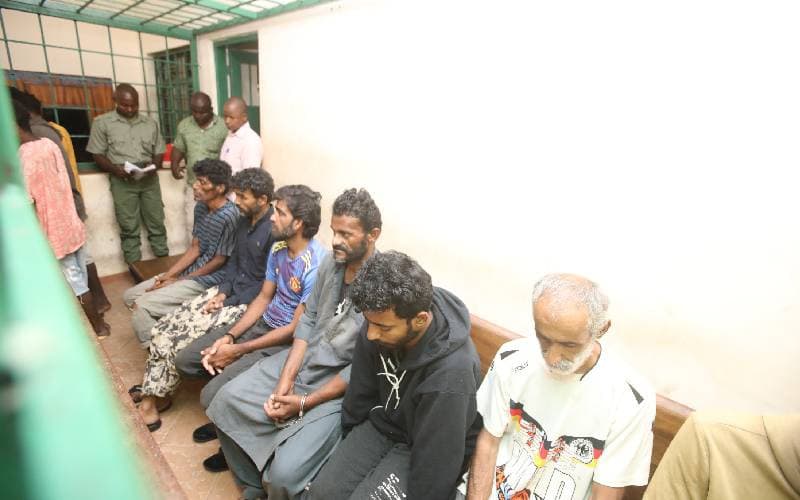We're loading the full news article for you. This includes the article content, images, author information, and related articles.
The high-stakes narcotics case against six Iranian nationals took a dramatic turn as the accused rejected a court interpreter provided by the US Naval Criminal Investigative Service (NCIS), raising questions about communication and procedure in one of Kenya's largest drug busts.

MOMBASA, Wednesday, October 29, 2025 (EAT) – The trial of six Iranian nationals charged with trafficking methamphetamine valued at approximately Ksh8.2 billion faced an unexpected delay on Tuesday, October 28, 2025, at the Shanzu Law Courts in Mombasa. The defendants unanimously refused the services of a Baluchi-English interpreter linked to the United States Naval Criminal Investigative Service (NCIS), creating a procedural puzzle for the court.
The six accused — identified as Jasem Darzadeh Nia, Nadeem Jadgal, Imran Baloch, Hassan Baloch, Rahim Baksh, and Imtiyaz Daryayi — expressed their distrust in the interpreter provided by the American agency. Through a replacement interpreter, they alleged that the NCIS-linked individual was failing to communicate court proceedings effectively and was providing only brief, inadequate translations of lengthy statements. “We reject him, we do not understand him,” the suspects stated in unison, as reported by court proceedings.
An NCIS representative present in court confirmed that the interpreter had been contracted by the agency to assist with communication. However, following the suspects' objection, Shanzu Chief Magistrate Anthony Mwicigi was compelled to accept the services of Mr. Amin Ahmed Juneja, an interpreter sourced by the Kenyan Judiciary who is experienced in Urdu, Baluchi, and Farsi.
The case stems from a major multi-agency security operation in the Indian Ocean. On Saturday, October 25, 2025, a stateless dhow, codenamed 'IGOR', was intercepted by the Kenya Navy approximately 630 kilometers off the coast of Mombasa. The operation, 'Bahari Safi 2025.01', was initiated based on intelligence regarding a suspicious vessel operating in the region. A joint force including the Directorate of Criminal Investigations (DCI) Anti-Narcotics Unit and the Kenya Coast Guard boarded the vessel and escorted it to Kilindini Port.
A court-sanctioned search revealed 769 packages containing a crystalline substance. The substance was later confirmed by the Government Chemist to be methamphetamine with a purity level of 98 percent, weighing a total of 1,035.986 kilograms. The estimated street value of the haul is Ksh8.2 billion (approximately $63 million), making it one of the largest narcotics seizures in Kenya's history.
This high-profile bust underscores Kenya's position as a significant transit hub for international drug trafficking syndicates, a concern repeatedly highlighted by security agencies. The Director of Public Prosecutions (DPP) has successfully applied to detain the six suspects for 30 days to allow for a thorough investigation. In an affidavit, Inspector Shadrack Kemei of the DCI's Anti-Narcotics Unit argued that the suspects are part of a major transnational syndicate and pose a significant flight risk as they have no fixed abode in Kenya. Investigators are currently conducting a forensic analysis of seized electronic devices, including a Thuraya satellite phone and a GPS device, hoping to dismantle the wider trafficking network.
The case is being prosecuted under Kenya's stringent Narcotic Drugs and Psychotropic Substances (Control) Act, which carries severe penalties, including life imprisonment. This incident puts renewed pressure on Kenya's judicial and security frameworks to effectively combat the narcotics trade. It also recalls previous major seizures, such as the 2014 case of the MV Al Noor, which ultimately collapsed, providing lessons that the Office of the DPP will be keen to avoid repeating. As recently as October 8, 2025, the National Authority for the Campaign Against Alcohol and Drug Abuse (NACADA) warned of a dangerous global shift towards potent synthetic substances and acknowledged that Kenya is increasingly becoming a destination market, not just a transit route.
Keep the conversation in one place—threads here stay linked to the story and in the forums.
Sign in to start a discussion
Start a conversation about this story and keep it linked here.
Other hot threads
E-sports and Gaming Community in Kenya
Active 9 months ago
The Role of Technology in Modern Agriculture (AgriTech)
Active 9 months ago
Popular Recreational Activities Across Counties
Active 9 months ago
Investing in Youth Sports Development Programs
Active 9 months ago